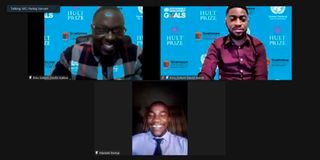Strathmore trio on track to win business and innovation award

A video call screengrab of the winning Kivu Sokoni team comprising Dastin Kakira (top left), David Ikundji (top right) and Ghislain Mastaki.
What you need to know:
- Founded in 2010, the Hult Prize challenge is the world’s largest social impact competition.
- Every year, students worldwide compete to solve a pressing social problem in food security, water access, energy and education.
Strathmore University’s Kivu Sokoni, a team comprising three international students from the Democratic Republic of Congo, were crowned the regional impact summit champions in the Hult Prize challenge held on Saturday.
The trio, whose agricultural idea impressed the judges, are Dastin Kakira, a Strathmore alumnus with a masters degree in telecommunications engineering and the chief executive officer, Ghislain Mastaki, a commerce graduate and the chief financial officer and David Ikundji, a network engineering student at DePaul University in Chicago and the chief technology officer.
Founded in 2010, the Hult Prize challenge is the world’s largest social impact competition organised in partnership with the United Nations.
Every year, students worldwide compete to solve a pressing social problem in food security, water access, energy and education by developing a scalable and sustainable social enterprise.
Finalists pitch to a panel of judges, captains of industry and thought leaders for a chance to win $1 million in seed capital. Each year, former US president Bill Clinton chooses the challenge topic and announces the winner in September.
To make it to the finals, students first battle it out within their universities to qualify for the regional competition from which one winner is selected to move on to the accelerator programme. This is an eight-week event that grooms six top teams that battle it out at the global finals in New York City in the USA.
Hult Prize challenge
This year’s theme is “food for good”. On Saturday, Strathmore University hosted the regional impact summit which attracted over 40 teams from all over Africa. Due to the pandemic, however, the event was held virtually.
“It was interesting because, contrary to our worries, we actually found it easier to manage the event online,” Dorcas Otieno, faculty lead for the Hult Prize in Strathmore told Nation.
The event started on Friday at 5pm, where teams were instructed on pitching and presentation.
The event was graced by keynote speakers such as Farhia Jama of Holby Training Solutions and recently a Parklands TedX speaker, Sonia Kabra, 2016 Hult Prize winner and founder of Buupass, Humam Dweik, Hult Prize organiser and Dr Vincent Ogutu, the vice-chancellor designate, Strathmore University.
Having a virtual event meant that the organising team had to work differently.
“One of the major challenges we faced was internet connectivity. To counter this problem, we asked the teams to send pre-recorded video pitches to be played live during the competition,” said Cliff Nyakundi, Hult Prize Africa regional director.
Strong showing
Kivu Sokoni, who had enjoyed a strong showing at the on-campus level in Strathmore University earlier this year, were a hit at the regional level.
“The win for us is an affirmation that we are on the right track,” said Mr Kakira.
Kivu Sokoni is a semi-online marketplace that connects farmers and local suppliers and manufacturers to consumers.
It creates an integrated value chain by putting in place logistical and technological infrastructures to support all key players.
“Kivu stood out because its idea is already tried and tested. The team has made sales and profits from its prototype and it has already secured its partners,” said Murad Rayani, a senior producer at entrepreneurial TV show “The Lions Den” and one of the judges in the competition told Nation.
The firms aims to boost agricultural production and empower rural farmers in eastern DRC’s Kivu province, especially women.
Kevin Maina is a communication and media student at Kenyatta University.
Are you aged 10-20 and would like to be Nation’s young reporter? Email your 400-600-word article to [email protected]





